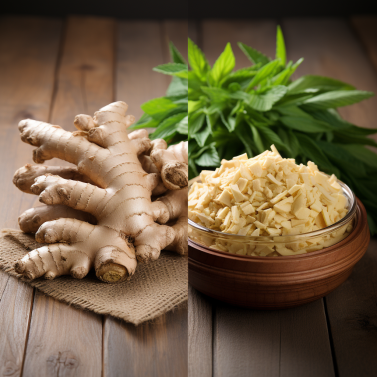
Ginger, a root spice used worldwide, is celebrated for its flavor and medicinal properties. It comes in two main forms: fresh and dried. While both forms offer health benefits, they differ in terms of nutrient composition, health impacts, and culinary uses. This blog explores whether one form of ginger is superior to the other in terms of health benefits.
Introduction to Ginger and Its Forms
Ginger, scientifically known as Zingiber officinale, is a flowering plant whose rhizome (root) is widely used as a spice and a folk medicine. It can be consumed in various forms, with fresh and dried (or powdered) ginger being the most common. Understanding the differences between these forms can help you choose the right type for your health needs and culinary uses.
1. Nutritional Content: Fresh vs. Dry Ginger
Fresh ginger is rich in water and contains vitamins like vitamin C and B6, along with minerals such as magnesium, potassium, and zinc. Dry ginger, on the other hand, has a lower water content, which makes its nutrients more concentrated. This includes a higher level of certain minerals and antioxidants.
2. Health Benefits of Fresh Ginger
Fresh ginger is known for its anti-inflammatory and digestive properties. It's commonly used to alleviate nausea, aid digestion, and reduce inflammation. The presence of gingerol, an active component, is responsible for many of its medicinal properties.
3. Dry Ginger and Its Potent Effects
Dry ginger loses some of its gingerol during the drying process, but it gains other compounds like shogaol, which is more potent and has strong anti-inflammatory and antioxidant properties. Dry ginger is often used in traditional remedies for treating colds, flu, and menstrual pain.
4. Culinary Uses: Flavor Profile and Versatility
In cooking, fresh ginger offers a sharp, pungent taste, ideal for fresh dishes, marinades, and teas. Dry ginger provides a spicier, warmer flavor, making it suitable for baking and spice blends. Your choice depends on the flavor profile you seek in your dishes.
5. Shelf Life and Storage
Fresh ginger can be stored in the refrigerator for up to a month, while dry ginger powder has a longer shelf life and can be stored in a cool, dry place for several months. The convenience of storage might influence your choice depending on your usage patterns.
6. Digestibility and Absorption
Some people find fresh ginger easier to digest compared to its dried form. This could be due to the higher fiber content in fresh ginger, which can aid in digestion and prevent constipation.
7. Potential Risks and Considerations
Both forms of ginger are generally safe for consumption. However, in large quantities, they can cause heartburn, diarrhea, or mouth irritation. People with gallstone disease or those on blood-thinning medications should consult a healthcare provider before consuming high amounts of ginger.
8. Making the Right Choice for Your Health
The choice between fresh and dry ginger should be based on your specific health goals, culinary preferences, and any existing health conditions. Both forms offer significant health benefits, but their effects can vary slightly.
Conclusion: A Spice for Health
Whether you choose fresh or dry ginger, incorporating this versatile spice into your diet can contribute to your overall health. Understanding their unique properties and health benefits allows you to make an informed decision that aligns with your dietary needs and cooking habits.
Sources and References:
- "Ginger: Health benefits and dietary tips" - Medical News Today
- "The Amazing and Mighty Ginger" - Herbal Medicine: Biomolecular and Clinical Aspects
